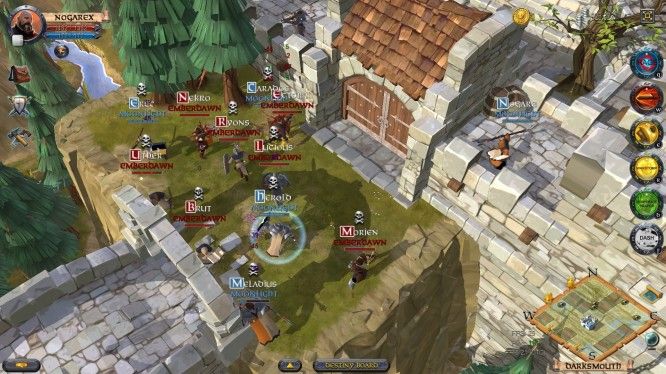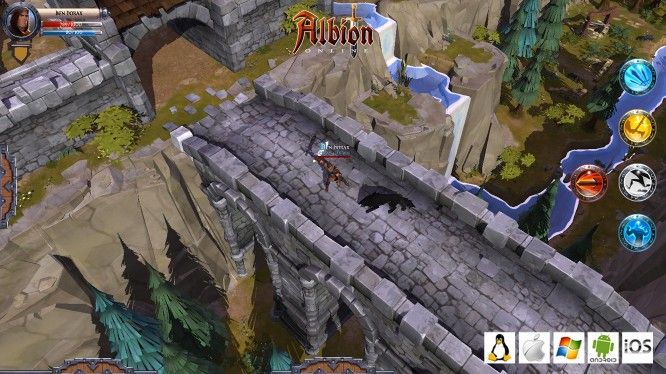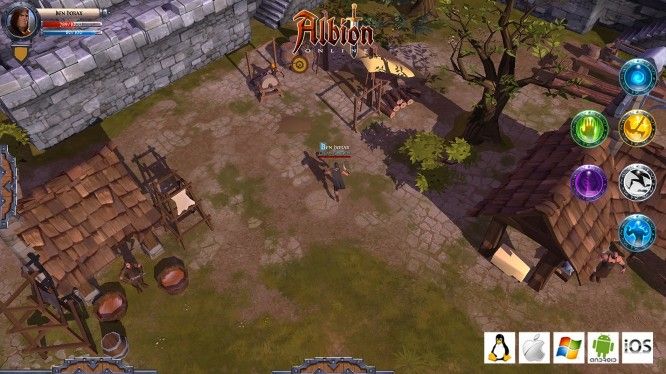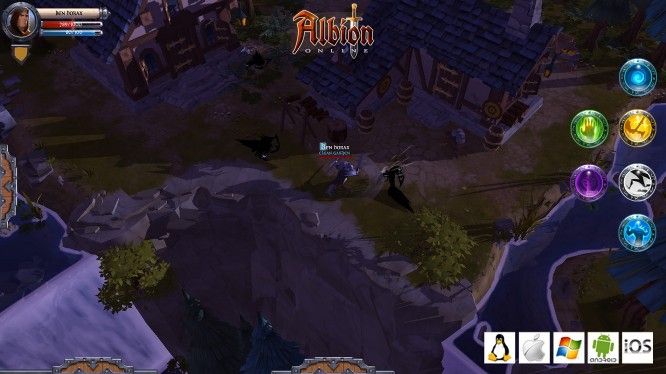Collaboration preview by Matthew McDanel and Matthew Nelson.
Albion Online from Sandbox Studios is quite the ambitious MMORPG. In a new trend, upcoming titles often take a step back to a previous era, emphasizing open gameplay. This is a refreshing change from the streamlined “theme park” approach commonly found in games such as World of Warcraft, Wildstar, SWTOR, LOTRO, among several other titles. Albion Online also takes away from the typical ‘class’ orientation that is commonly found in modern MMORPGs. It boils down into an “as you will” notion that has been greatly missed in the genre.
For many, loading Albion Online for the first time will cause memories to flood your mind. It’s hard not to reminisce as you click your way through the robust environment. Game play mechanics brings us back to Ultima Online. Art style and movement feels like a cross between a dungeon runner and Runescape. This is in no way a bad thing, in many ways it feels like a spiritual successor to classic MMOs. Despite these similarities, the title brings plenty of fresh concepts to the table.
Albion promotes itself as, “the first true cross platform MMORPG”. Albion ran relatively smooth on both an LG Spectrum 2 and a Nexus 7 tablet. However, due to the hardware of these devices, frame rate chug and client side lag was a consistent problem. For me, this rendered the game unplayable via android devices. At this time there are no client side options for scaling the game’s graphics and other run-time variables; we would like to see these features on release. It’s not quite perfect but it feels very close even at this alpha stage of development.
The game is developed using the Unity engine. It serves the game very well. Among other features, this allows play in both a browser and via a standalone client. Using the unity platform also allows for new content to be streamlined into the game at a quick pace. Hopefully, after release this will allow the developers to produce more content in a quick timeframe. Console gamers, I have bad news for you - unfortunately, there are currently no plans for Albion to be converted on to console platforms.
Skill progression seems to work as an improvement to the system that Runescape employed over the years - ditches the traditional level mechanic completely - and instead uses what’s called the “destiny board”. All newly created characters begin at the bottom of the destiny board. Progression through the Destiny board often feels more like earning achievements than it does “gaining XP”.
Albion allows you to set goals to acquire skills and roles instead of having cliché, pre-concluded, roles. It is also great not being forced to re-roll each time you wish to try something new. If you ever want to switch to something else, just equip new items! Unlike some other sandbox style MMOs, there are no caps to the amount of professions you can master. With enough play time it is theoretically possible to finish the entire Destiny board.
As you learn the basics of the game such as combat, gathering, and item crafting over roughly 10 – 30 minutes, you will craft a sword, a shield, and medium armor. These are all Tier 1 gear and reflect a position on the destiny board as you move toward the center. From here, skills and activities branch out into advanced versions of previously mentioned categories increasing the complexity of weapon and armor choices as Tier increases.
By Tier 4 gear, you are typically utilizing subcategories such as throwing knives (instead of bows), halberdiers (instead of sword/shield) or healing magic (in lieu of DPS magic). Suddenly, the game turns from bland and tasteless to well defined and controversial in a matter of a day of gameplay. Currently, there are 7 tiers planned for release with many more to come.
To move through to the next section of any given tree you must earn “fame” which sort of functions as “level experience” and sort of doesn’t. In the early stages of any tree the requirements are pretty broad. As you get deeper in to each craft, the requirements get much more specific and much more time consuming.
The structure of the map is pretty well designed. You have two layers. We’ll refer to the main map as the map, and what is referred to by the game as a “cluster” map as the sub layer. You can click on each clusters and zoom in and out to see where crafting stations and dungeons are located. Currently, most dungeons do not feature world bosses, but a few do. At the bottom of each cluster map is also a legend for resource availability.
There are three types of clusters: Safe, Limited-PvP, and PvP. In safe clusters, you cannot attack or be attacked by other players. In Limited – PvP clusters, you or your attacker receives a debuff if either of you engage. This grants gatherers a slight advantage for escape. In PvP, however, rules do not exist. Resources are abundant in these zones and so is the bloodshed.
Gathering is a huge, if not the biggest, aspect in the world of Albion. Resource nodes are absolutely everywhere and almost everything can be interacted with. Depending on population, you could be gathering 1 material from each node, or up to 16 from a single one. If you, for example, were to gather T3 materials in a safe zone, you will find them far less resourceful than in a limited-PvP cluster and even more so than a PvP cluster.
Even with its simplicity there are times that border on frustrating. It’s quite clear that the title is designed by veterans of the genre, and the death mechanics are on the verge of obnoxious. If and when you die, (it’s inevitable; it will happen) the game is anything but kind. In addition to high durability loss, anything on your person will drop into a lootable corpse.
PvP takes on a sort of MOBA direction by expecting the player to be timely and strategic with movement and ability use. Burst leaves you vulnerable while having the wrong gear in the wrong situation may cripple your performance. In recent gaming trends, focus has been taken away from the saturation of skill choices and more in a direction of build development and situational adjustment.
Fortunately, Albion’s ability mechanics prevents players from having too many “last resort” abilities. And with the amount of time it requires to create higher tier weapons and armor, risk and reward plays a big part in a player’s decision to hunt, by themselves, or gather in limited PvP and full PvP clusters.
Oh, we forgot to mention… If an item reaches zero durability, it is destroyed. However, in safe and limited-PvP zones, your corpse cannot be looted by other players for 10 minutes. But don’t fret! There are guild territories that can be found in all limited-PvP and PvP clusters around the world. These territories can be claimed, sold, and even stolen!
One of the more interesting aspects of this project is the open world housing. Player buildings are not instanced; instead they are on real in game real estate. There are a slew of different structures that can be built. Open world housing is handled by “renting” the use of one of the various designated plots in the game world. The available land seems plentiful and due to the games expandable nature shouldn’t be an issue during full release.
Beyond regular homes crafting above Tier 3 must be done at player made crafting stations each of which have a tax percentage in place. Past the lower tiers, nearly everything in the game is player controlled; in exception to NPCs, of course. If you happen to have a tycoon personality, even you can enjoy the business style implementations of Albion Online by capitalizing on the needs of others. You may even establish trade services for players or guilds looking to transfer large quantities of items from one location to another. The possibilities are very extensive.
Building construction of any kind is no easy feat. The “job” perspective embedded in MMORPGS is brought to a whole new level. Getting the required materials and money for the upkeep requires either a lot of time or player cooperation. Picking locations and knowing who to market to without hurting the political position of your guild can be tough. Plus, there will be nothing to stop spies!
Albion Online shows a lot of potential although it remains rough around the edges. The classical approach might not appeal to everyone but it remains a well-developed and thought out project. Some Irony can be found in its cross platform approach; the game makes an attempt to reach a broad audience but remains a hardcore title that may only appeal to a niche player base.
All in all, I feel that Sandbox studios has brought the complexity of EVE online down to a familiar, classic fantasy realm. They have conceived a beautiful cyclical concept which I believe is going to change what we know to be the “casual” MMORPG. Will Albion be the roaring success Sandbox studios hopes it will be? We aren’t sure, but we enjoyed our time lost in reminisce.



